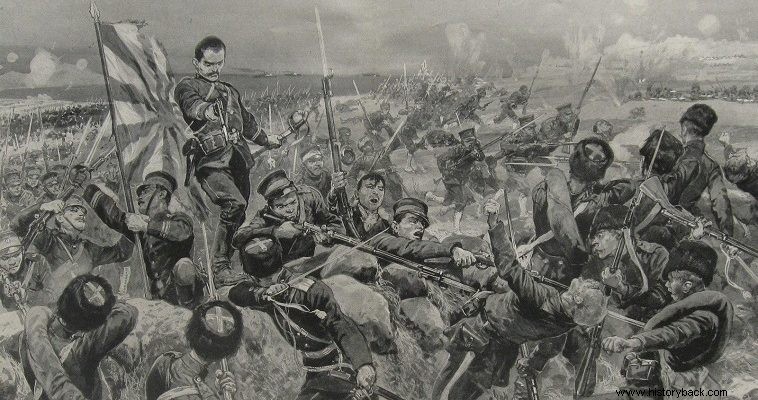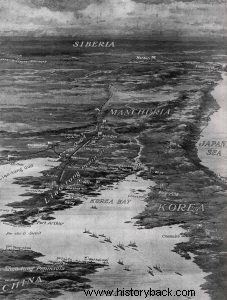
The Battle of Sandepu was one of the most important battles of the Russo-Japanese War (1904-05) fought in Manchuria, in the homonymous village near Mukden. After the great battle of Shaho where the Russians suffered a tactical defeat against the inferior Japanese, the two armies deployed against each other on an extended front.
The Japanese had deployed the 1st, 2nd and 4th Armies opposite Mukden not expecting a new conflict as the particularly heavy Manchurian winter had already arrived.
The first error
The Russians took advantage of the respite to move additional forces into the area. But the Japanese, after the fall of Port Arthur on January 2, 1905, also had the 3rd Army available. The fall of Port Arthur particularly worried the Russian commander-in-chief, General Alexei Kuropatkin, who decided that he should attack the exposed Japanese left side with the prospect of launching, in the second year, a general counterattack before the Japanese 3rd Army also intervened.
The Russians had deployed on their right flank the 2nd Manchurian Army (2nd MS) under the Swedish-Finnish general Oskar Grippenberg. The army had the 8th Army Corps (SS), the 1st Siberian SS (SS) and in addition two independent Infantry Divisions and significant cavalry forces.
The commander of the 2nd Army was not, however, optimistic about the outcome of the counterattack in general and about the role of his army in particular. He agreed with the general-in-chief's plan only when he demanded and succeeded that his army's attack be carried out in coordination with the other Russian armies.
However, information security was not the Russians' strong suit and so the plan of the attack - which was attributed to Gripenberg - was leaked and presented in the pages of the first French newspaper in circulation in Paris and from there to the whole world! /strong> Of course the Japanese prepared as best they could.
The second error
As if that wasn't enough Kuropatkin made a second mistake by ordering a corps of his cavalry, under General Mystenko, to seize the strategically important railway station in the village of Niushang which the Japanese had converted into a supply base. But winter in Manchuria is not the right time for mass cavalry movements, especially if no one has taken care of their supply.
Thus it took the Russian cavalry six days to reach their objective. When he did not arrive, the Japanese, who were now monitoring their movements, had reinforced their troops there, with the result that three Russian attacks ended in failure. The beleaguered Russian cavalry made their way back, marching another six days through the dead of winter.
A series of fatal mistakes
Undaunted, Kuropatkin, without even changing his plan, on January 19 ordered the 2nd MS to attack. The army threw 75,000 men into battle. Facing it was the Japanese 2nd Army under General Yoshikata Oku, with 40,000 men. Oku had a reputation as an excellent tactical operator, but also as a lone wolf who operated independently avoiding much contact with the upper echelons.
The 2nd SS started the attack on January 25, 1905. The 1st SSS attacked the village of Heikutai, which it captured, but with serious losses. The Russian 14th MP which was supposed to occupy the village of Sandepou, failed to coordinate its movements with the 1st SSS and finally attacked a day late (!) on January 26. The worst part was that he didn't even attack the village of Sandepu, but the neighboring village of Paotaitsu where the entire Japanese 5th Infantry Division was deployed.
As a result, the Russian 14th MP suffered terrible losses. To make matters worse, Grippenberg sent word to Kuropatkin that Sandepu had been captured! At the same time, apparently unaware of the situation, he ordered his men to rest on January 27.
But the area he designated as a place of rest and reconstruction had not been occupied, but was held by the Japanese. So the head of the 1st SSS, unable to do anything else, ordered... an attack! The attack merely added another 6,000 casualties to the ill-fated 2nd WW
It was not until January 28 that Grippenberg realized that Sendepu had not been captured and instead "cut" the front of his army in half. So he decided to continue the attack. But then it was Kuropatkin's turn to make another mistake by ordering a halt to the attack and a retreat , despite the fact that the Russian forces were outnumbered, still, despite the losses.
In the meantime, the commander of the 1st SSS General Stackelberg, ignoring the orders of his superiors, attacked Sendepou, supported by the cavalry and managed to capture part of the village. Then Kuropatkin, instead of taking advantage of the "holy" (according to Guderian) disobedience of his subordinate, removed his command... Fatefully, the 2nd MS began to retreat. But the Japanese immediately counterattacked and recovered all the lost ground.
Consequences
Grippenberg was relieved of his administration by Kuropatkin. Returning to Russia, however, he gave an interview in which he blamed Kuropatkin for the defeat. He continued this tactic for a long time. Stackelberg was formally charged with insubordination by Kuropatkin, but instead of being punished...he was decorated.
The palinody had cost dearly in Russian blood. The 2nd WW has losses of at least 12,000 in killed, wounded and captured – other sources say 20,000 casualties. The Japanese had 2,000 dead and 9,000 wounded. The defeat had a serious effect on the morale of the Russian army and people. The soldiers never understood why they were ordered to retreat while they were victorious and realized the utter incompetence of their leaders.

